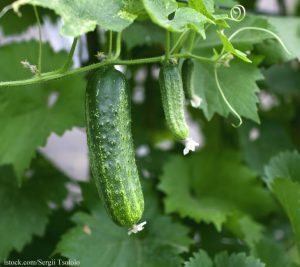The FDA is ramping up testing of cucumbers and hot peppers, after six reports of food poisoning outbreaks linked to cucumbers from 1996 to this year. Those foods are eaten raw, and they are often contaminated.
 Produce can be contaminated in several ways. It can come into contact with polluted water, or dirty equipment during growing, harvesting, and post-harvest production. Ill workers who harvest and sort the produce by hand can also contaminate it. The government is seeking information on the prevalence of Salmonella and E. coli O157:H76 on fresh cucumbers.
Produce can be contaminated in several ways. It can come into contact with polluted water, or dirty equipment during growing, harvesting, and post-harvest production. Ill workers who harvest and sort the produce by hand can also contaminate it. The government is seeking information on the prevalence of Salmonella and E. coli O157:H76 on fresh cucumbers.
There is currently a Salmonella outbreak linked to slicer cucumbers imported from Mexico by Andrew & Williamson Fresh Produce. The CDC reports that 838 people in 38 states have been sickened in the past two months.
Fresh hot peppers are another concern. In 2008, this product was associated with an outbreak that sickened 1,500 people, hospitalized 308, and killed two. And since 2010, Salmonella-tainted hot peppers have been responsible for eight product recall. This vegetable can be a “stealth component” in multi-ingredient dishes, making it a health risk.
The FDA will collect sales of cucumbers and hot peppers beginning November 2015. The sampling will take place throughout the year and across all seasons. The samples will be collected at ports of entry, where foreign goods are cleared for import, and domestic and import samples from packing houses, manufacturers, and distributors across the country.
Public officials will collect 1,600 samples of each vegetable, with close monitoring to make sure no facility is over sampled. The breakdown between domestically produced and imported cucumbers will be 380 domestic samples and 1,200 improved. For hot peppers, the breakdown will be 320 domestic samples and 1,280 imported samples.
All varieties of whole, fresh, raw cucumbers will be collected, whether they are grown in farm fields, in greenhouses, or hothouses. Frozen, chopped, pureed, or pickled cucumbers will not be sampled. All varieties of hot peppers will also be sampled, including jalapeños, and serrano peppers, grown under a variety of conditions.
The produce will be tested for Salmonella and for E. coli O157:H7. Hot peppers will also be tested for Shiga toxin-producing E. coli. Whole genomic sequence testing will be conducted on any samples that test positive. This information will be added to databases that are used to match human illnesses with food sources.
Firms will not be notified before samples are collected, except if the collection will occur at a packing house on a farm. The FDA is authorized to sample foods as part of its charge to ensure the food supply. The results will be published on a quarterly basis.




